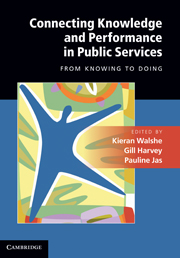Book contents
- Frontmatter
- Contents
- List of figures
- List of tables
- List of boxes
- Notes on contributors
- Foreword
- 1 Introduction: knowledge and performance – theory and practice
- 2 Knowledge from inspection: external oversight and information to improve performance
- 3 How is information used to improve performance in the public sector? Exploring the dynamics of performance information
- 4 Citizens, users or consumers: the voice of the public and its influence on improving performance
- 5 Competition and choice: the place of markets in connecting information and performance improvement
- 6 The role of corporate governance and boards in organisational performance
- 7 Change at the top: connecting political and managerial transitions with performance
- 8 The role of leadership in knowledge creation and transfer for organisational learning and improvement
- 9 Process Improvement and Lean Thinking: using knowledge and information to improve performance
- 10 Using evidence: how social research could be better used to improve public service performance
- 11 Absorptive capacity: how organisations assimilate and apply knowledge to improve performance
- 12 Knowing through doing: unleashing latent dynamic capabilities in the public sector
- 13 Conclusions: a puzzle, three pieces, many theories and a problem
- Index
- References
12 - Knowing through doing: unleashing latent dynamic capabilities in the public sector
Published online by Cambridge University Press: 05 July 2011
- Frontmatter
- Contents
- List of figures
- List of tables
- List of boxes
- Notes on contributors
- Foreword
- 1 Introduction: knowledge and performance – theory and practice
- 2 Knowledge from inspection: external oversight and information to improve performance
- 3 How is information used to improve performance in the public sector? Exploring the dynamics of performance information
- 4 Citizens, users or consumers: the voice of the public and its influence on improving performance
- 5 Competition and choice: the place of markets in connecting information and performance improvement
- 6 The role of corporate governance and boards in organisational performance
- 7 Change at the top: connecting political and managerial transitions with performance
- 8 The role of leadership in knowledge creation and transfer for organisational learning and improvement
- 9 Process Improvement and Lean Thinking: using knowledge and information to improve performance
- 10 Using evidence: how social research could be better used to improve public service performance
- 11 Absorptive capacity: how organisations assimilate and apply knowledge to improve performance
- 12 Knowing through doing: unleashing latent dynamic capabilities in the public sector
- 13 Conclusions: a puzzle, three pieces, many theories and a problem
- Index
- References
Summary
Introduction
Public sector managers are increasingly asked to do more with less. They are expected to find ways to improve organisational performance – even in times of decreasing financial resources, and often in the face of scarce human resources. Even if they know how to make improvements, they may not be able to implement the appropriate changes. A gap may exist between what is known and what is done – what Pfeffer and Sutton (2000) called ‘the knowing–doing gap’. The newer waves of knowledge translation research (e.g. Grimshaw et al. 2005) frame the gap as a disconnection between knowledge acquisition and the use or implementation of that knowledge. Similarly, a recent systematic review of diffusion of innovation (Greenhalgh et al. 2004) refers to the lags or gaps between knowledge, action and innovation as indication of oversimplification of diffusion models combined with a lack of robust evidence concerning how diffusion occurs and indicators of when and how it is successful.
In addressing the knowing–doing gap within the context of improving performance in a public sector organisation, a shortage of management or organisation-based knowledge can create a gap in knowledge acquisition. The assumption that public sector managers should be able to understand what needs to be done to achieve organisational goals and activities presumes their ability to develop and use managerial strategies towards these ends. Accordingly, strategy in the public sector has become an increasingly relevant research topic (Llewellyn and Tappin 2003).
Information
- Type
- Chapter
- Information
- Connecting Knowledge and Performance in Public ServicesFrom Knowing to Doing, pp. 251 - 275Publisher: Cambridge University PressPrint publication year: 2010
References
Accessibility standard: Unknown
Why this information is here
This section outlines the accessibility features of this content - including support for screen readers, full keyboard navigation and high-contrast display options. This may not be relevant for you.Accessibility Information
- 6
- Cited by
